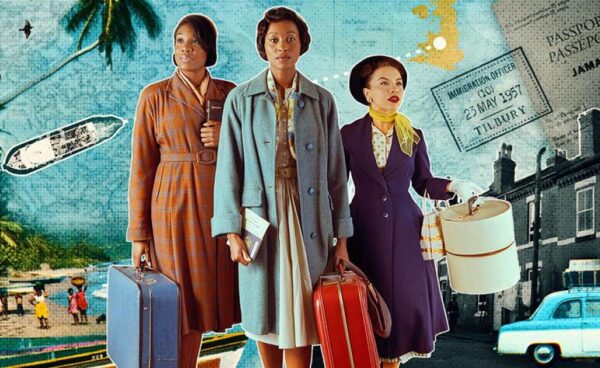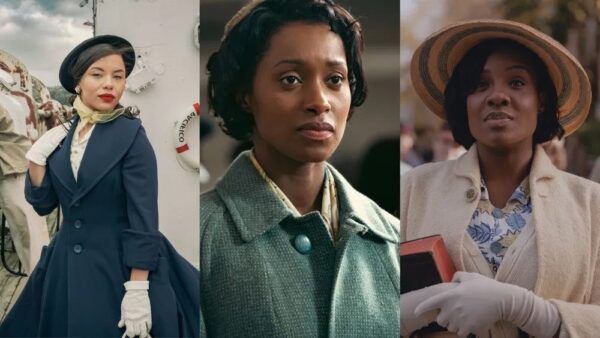‘Three Little Birds’ has taken flight on ITV.
Helmed by Sir Lenny Henry, the rivetting series chronicles immigration, community and the strength of Black womanhood through the lens of a mother and all those who have travelled to make Britain their home.
That Grape Juice‘s Feyi Adebanjo sat down with Sir Lenny Henry and the show’s stars Rochelle Neil, Yazmin Belo, and Saffron Coomber who opened about the inspiration behind its creation, the Windrush generation, and the future of Black stories in the entertainment industry.
Join us below….
That Grape Juice (Feyi): Sir Lenny, this story has such a personal resonance with you. You continue to have such an incredible career, what about this particular time ignited the drive within you to bring ‘Three Little Birds’ to screens?
Sir Lenny Henry: I think I’ve written several things. I went through this big thing of further education. I did a BA in English, because my mom passed away in 1998. And she’d always said to me, you must get an education to have something to fall back on. And I never listened to her. I went straight into showbiz when I was 16. And then in 1998, I was doing a show called ‘Hope and Glory,’ about an idealistic head teacher and I thought, this script inspires you. I’m not sure how well the TV series was. But when I was in it, I was inspired every day. And I thought I’m going to do my education. So got through all that. I did MA in screenwriting, I did a PhD in screenwriting, and about kind of inclusivity in television and film. And I thought I want to do something that honors my parents.
I wrote a couple of scripts, and I wrote a couple of things for the BBC and didn’t really do well. Then I asked Russell T. Davies to mentor me. And Russell was brilliant. I didn’t have to write. He just said, Well, what do you want to do? You know the thing when somebody asks you what you want to do. And I said, I want to talk about Post-Windrush. There was talk about Windrush. But what about the people that came 10 years after, 15 years after, 20 years after? What about them? What about their story? And so it began, and we talked in the room, and then Tiger Aspect, and Lucy Bedford, and all these people came on board. And suddenly, this narrative about these three complex women suddenly began to come up. Like wood churning butter, they came up. And I wanted to think, we haven’t seen these women before on television.
We’ve got a thinker and an actor. We’ve got a kind of religious woman who slowly realizes that there might be more to life than that. You can be very isolated in your world, in Jamaica. And then suddenly, you come to a place where there are movies and there are new people to meet and there’s the possibility of being in a new church or meeting a new man or something. Suddenly your life can change. And I wanted to reflect all of that, because I remember my parents saying to me. You’d be listening outside the front room where they had the plastic on the sofa. And now the liquor or drinks cabinets and liquor shot glasses with the gauges on them. You’d be listening at the door, you can hear adults talking and smoking in there. And then you look through the window and then go, boo! This is big people thing and then they’d slam the door in your face. I wanted to write a show about big people things. That’s what it’s about.
That Grape Juice: With this show, you’re all shining a light on such an important story. How did this inform your approach when bringing your characters to light?
Rochelle Neil: I think for me, it was that feeling of people don’t know what they don’t know. So, like, sometimes the decisions that say Leah would make, I’d be like, well, what about this? What about that? But that like these questions that I would ask of her weren’t options because they didn’t either exist. Women were economically silenced at that time. People didn’t leave their husbands, they didn’t get divorced. But migration was a thing that she could do. So, I found that an interesting route, because maybe nowadays, we wouldn’t move countries, we would just get divorced or…
Sir Lenny Henry: Or go to a refuge.
Rochelle Neil: Or go to a refuge. There are so many more resources available to women nowadays. So, I think the biggest thing for me was being sort of a constant reminder. Even in terms of racism and things like that. I would feel very comfortable to call someone out if I felt that they were being racist. Whereas we see often in our show, a stoicism and a sense of dignity that I would probably get a little bit intense in those moments. But that was not something that was an option because people were killed with lynchings. We couldn’t go to the police.
Sir Lenny Henry: Police wouldn’t really look at you or listen to you.
Rochelle Neil: So, I think it was an exercise in comparisons. I was very lucky. My nan wrote an autobiography. So, I had a firsthand account of almost a mindset for that time.
That Grape Juice: Did she get her autobiography published?
Rochelle Neil: No. No. She didn’t. I think you might be able to find it online. Her name is Amber Z. Neil. But it was very, very interesting. And for me, it was just a game of comparison. A lot of like that’s so interesting. That’s so interesting. Because again, people don’t know what they don’t know. And I’m seeing things from a modern lens, whereas our show is set in 1957.
Yazmin Belo: Unfortunately, there wasn’t much live footage of women specifically from the Caribbean in the 50s of that time. So I went back to the source, which was my Aunties, my mom. And without giving away too much of the storyline, or the character and my mom sit down and read this with me, it was just kind of re-immersing myself back into childhood. And I was in Coventry, and my parents lived in London. And so, making frequent phone calls to have conversations and to indulge under the pretense of it being conversation, but actually research (for this role).
Sir Lenny Henry: So, when you were talking to them, would they stop and tell you a story about that?
Yazmin Belo: Yeah, well my dad is Nigerian. I am half and half. My dad’s Nigerian, my mom’s Jamaican. And so, it would be specific. My call log being mom, mom, mom, dad, friend, guy. It was just lots of conversations with mom, and it just flowed like water. My mom enjoys hearing the sound of her own voice So it would just be like, okay, so mom, do you remember when auntie had to come back prematurely and what happened then?
She had photographs, there are written letters. A lot of my mom’s family are academics. So maybe about 8% of my family in Jamaica are teachers. And fun fact. The churches, Jamaica has the most churches per square mile in the whole of the Caribbean. And so, my great-granddad was a pastor. So, these were all little bits that I kind of took to kind of add to. So, it was nice. It was live research. It was really, there’s only so much you can get from the internet of that time for those women.
Saffron Coomber: My family, I would say the women, particularly over a generation would emulate Leah or Hosanna. There’s not many women in my family, who I feel like are Chantrelle. And of course, on top of the research, I was watching what documentaries I could find. I did read the diary of Rochelle’s grandmother; there are many similarities within my own family stories as well. Like asking questions of my aunties. Unfortunately, my grandparents have passed now, but from what I did receive of them growing up and all of that I had. But the thing about Chantrelle is that, I do think she is, as you said earlier, she’s not a stereotypical woman. She’s not a stereotypical Jamaican woman. And that really interested me because Jamaica was a hub for Hollywood in the 50s, which I had no idea about. Ian Fleming wrote James Bond novels there.
Sir Lenny Henry: Errol Flynn lived there. Noel Coward lived there.
Saffron Coomber: It was really happening, particularly obviously in the city. So, for me, what was interesting is the idea of who would she look at as a role model? What mannerisms would she adopt? Or having access now to this new exciting thing. So for me, I really enjoyed looking into the films of Dorothy Dandridge and Lena Horne and similar.
Sir Lenny Henry: Harry Belafonte, Carmen Jones.
Saffron Coomber: Yes, yes, yes. There’s so much that I think –
Sir Lenny Henry: Mae West.
Saffron Coomber: Mae West, that’s what I am thinking of.
Sir Lenny Henry: Come up and see me sometime.
Saffron Coomber: Come and see me sometime. That was really fun for me. For me, I love to use physicality to get into a role. And because obviously, the 50s is a completely different time. Women moved in different ways, literally, because their clothing was so restrictive. So, for my character anyway, she would be in heels, she would be in a gusset. She’d be wearing her gloves, which makes you move your hands in a different way, they smell in a different way. I love, I love all of that. I find it very helpful to get me out of my 2022 at that time, body.
That Grape Juice: There’s a long-running and ongoing discourse about the need for more Black stories on screens and crucially more diverse Black stories. ‘Three Little Birds’ contributes to this need amazingly. With that, what changes do you feel are needed to ensure this flow of Black brilliance continues to receive its due?
Sir Lenny Henry: I think just back us. I’m talking about, it’s interesting. You can wave your flag from where you stand. So, it’s all right. Back us, we got loads of stories, come see us. What do you want? I think that we face forward, we write our plays, we write our music, we write our monologue, we write our series. When we come see you, let us come in and sit down. And I think what’s gonna happen in the future is, we’re going to just make a play and do it. We’re going to just start doing things because we want to do them. We’re going to film things with our phone, because we want to do them and we’re going to make things. Because people react to our stuff. Whatever we’re doing.
I was talking to Jazzy B about this. He said, You know what? One minute, it’s overground. The next minute, everybody’s doing it. If we do stuff on the ground. If we’re in a basement somewhere making a play or a film or something. In a minute, somebody’s gonna go: that was brilliant, that thing he did in the cellar. We could do that. We can make money from that. And look how long people could have been exploited by other people. Because I think you’re missing a trick if we’re not sitting there going: What about this? We have loads of ideas. And going forward as a producer and a writer myself. I want to do stories that can embody us as a people, as human beings that can make you understand how we’ve fit into this world that we’ve made. Why it is multicultural, why it does have things to say to all of us, not just five people in a room internally. This show is for everybody, not just for one or two people. It’s for everybody. And I want to move forward in the future, making things that aren’t perhaps contemporary about life now. Life now is, we’re going through stuff now. I think that’s worth talking about and creating stuff about. I think these people embody these characters so beautifully. And I feel very blessed.
Rochelle Neil: And I think making a little seat at the table. I think it sometimes offsets the balance, but it’s never ever to do with talent. The talent is there, the work is there, the creativity is there.
Sir Lenny Henry: There are some people who are trying to be allies. It’s difficult because they’re holding on to their position with this. But there are some people that want to be allies and to elevate. But in a while, what’s gonna happen is, people are gonna just start to elevate themselves. Because you can do things for no money now. So, you’re gonna see, the next generation is making things for no money. And it will be impactful. It’ll be on Instagram, and you’ll go, what’s that thing I saw? The other day, my friend showed it to me. It’s brilliant. It’s already happening. So, I think that’s gonna be interesting. Because in the end, if you got 5 million followers or something or 6 million followers, like Mo Gilligan had. When he comes to the table to the Channel Four or something, and he goes, Well, what are you going to do for me? I’ve got 6 million viewers.
That Grape Juice: That’s a country. That’s more people than in Sweden.
Sir Lenny Henry: If That Grape Juice decides it wants to make a certain type of content, Yazmin’s written a play. Or you’ve done a monologue or you’ve got a thing you want to do. You can cut out the middleman. The gatekeepers are gonna have to learn that in the end, if you don’t give us a voice, we’re gonna speak anyway.
***********
‘Three Little Birds’ first premiered on ITV1.
All episodes are also available to watch now on ITVX.






























![Explosive Trailer: 'Real Housewives of Potomac' Season 10 Reunion [Part 3]](https://thatgrapejuice.net/wp-content/uploads/2026/02/rhop-season-10-reunion-karen-huger-tgj-1-464x260.png)
![TV Preview: ‘Married to Medicine’ [Season 12 / Episode 12]](https://thatgrapejuice.net/wp-content/uploads/2026/02/married-to-medicine-season-12-ep12-tgj-464x260.png)
